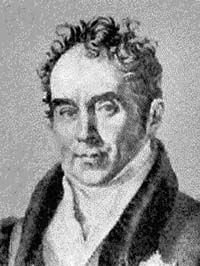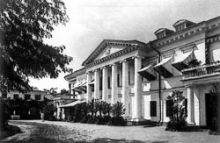Viktor Pavlovich Kochubei (1768-1834) was nephew of the “Most Illustrious Prince” Oleksandr Bezborodko, a powerful dignitary of the time of Catherine II. Wishing to bring up the boy, the uncle took him from Ukraine to Petersburg. Kochubei began his military service as a child: at the age of 8 he was commissioned a corporal in the Life Guards.
Another closest relative of his, Count Illia Bezborodko, was an army general who fought together with the great General Aleksandr Suvorov. I. A. Bezborodko attained special fame when storming Izmail as well as in the Polish campaign during the third partition of Poland. As a civil servant, the retired general rose to Active Privy Counselor and senator.
Kochubei received an excellent education at a private aristocratic boarding school. In 1784 the 16-year-old (!) youth was dispatched to the Russian embassy in Sweden to continue education at one of Europe’s oldest and most prestigious universities in Uppsala. In 1786 he returned to Russia and escorted Empress Catherine II on her tour of the Crimea. In 1788 V. Kochubei was seconded to the Russian mission in London. In England he managed to win the respect of Russian ambassador S. R. Vorontsov and maintained friendly relations with members of his family.
In the early 1790s, contrary to the wish of A. A. Bezborodko, Kochubei visited Paris, where he attended the lectures of Frederic- Cesar de La Harpe and avidly followed the stormy developments of the French Revolution. He made friends with Grand Prince Alexander Pavlovich after returning to Russia in 1792 and exerted considerable influence on the future emperor for a long time, which contributed very much to the “beautiful beginning of Alexander’s days.” He headed the society of the so-called young friends of Emperor Alexander I which also included Polish Prince A. A. Czartoryski, Count P. A. Stroganov, and Count N. N. Novosiltsev – brilliant and educated aristocrats who had visited England at various times. Their Anglophilia in fact molded reform-seeking public opinion in the early nineteenth century. According to the caustic remark of a contemporary, Kochubei “knew better than others the members of parliaments and their rights, he read all English political journalists and, like a lion cub in Krylov’s fable, was going to teach beasts to make nests.”
In 1792 Viktor Kochubei, “excellently recommended, and loved by all,” was appointed envoy to Turkey. He stayed in Istanbul until 1797. The next year he was appointed vice chancellor of the Collegium of Foreign Affairs and was soon awarded the title of count. However, the new count fell into disfavor with Emperor Paul I. The latter forced him to resign, following which Kochubei again went abroad, this time as a private person.
Immediately after the coup d’etat, in which Emperor Paul I was assassinated, Viktor Kochubei joined the nearest entourage of the new Emperor Alexander I and entered the Secret Committee, in fact the Russian Empire’s unofficial top consultative body, where he actively worked from 1801 to 1803. The committee discussed many government plans, including reform of the Senate and ministries. Very much attention was paid to solving the peasant problem. But when Kochubei, a rational and already experienced courtier, assumed the office of Russia’s top diplomat, he stood a bit away from the other committee members. Many contemporaries singled out, above all, such features of his character as caution and reasonableness.
In charge of the empire’s foreign policy, Viktor Kochubei believed that the latter should in the best eighteenth century traditions “be based on benefit to the state rather than on preference for one power or another,” considering England the foremost natural friend of the Russian Empire. Simultaneously, Alexander I was increasingly coming under the influence of Prussia. These conceptual differences resulted in a number of clashes with the emperor, and the latter brought Kochubei back to Saint Petersburg and appointed him minister of internal affairs in 1802. Arranging things in his office, the newly-appointed minister was greatly assisted by State Secretary Mikhail Speransky, the closest adviser of Alexander I at the beginning of his rule.
They did tremendous work to meet the country’s most urgent requirements, primarily to develop the Russian Empire’s agriculture and industry. Kochubei and Speransky cooperated for quite a long time. Some time later, it was Kochubei who consulted his colleague when the latter worked on a grandiose project of financial reforms. Our compatriot succeeded in drawing the attention of authorities to the Black Sea area. Yet, as our hero was still evincing an endless interest in foreign policy and retained some influence in the Russian foreign ministry, he finally broke with Emperor Alexander I in 1807 after a peace treaty was signed with France.
As a big landlord, Viktor Kochubei took quite an explicable attitude. Favoring the retention of trade relations with England, he vehemently opposed the Peace of Tilsit which subjected Russian foreign policy to French interests. Quite naturally, he became leader of the so-called English party, in fact a loyal opposition to the emperor. The relationship between Alexander I and Kochubei again cooled to the extent that the latter was “granted a leave” until 1810. As the reforms failed, Speransky also found himself on the receiving end: he was sent into “honorable exile” as governor-general of Siberia.
After defeating the Swedes and annexing Finland, Russia further strengthened its alliance with Napoleonic France. Viktor Kochubei had to drop his implacable attitude. Having visited France, he admired the way things went in Napoleon’s empire. Yet, not participating directly in the work of the government, he concentrated all his efforts on reforming the financial system. In 1812 his position appears ambiguous: an old opponent to alliance with France and a prominent representative of big landlords at court, he still did not want to strain relations with Speransky, a friend of France and the apologist of reforms. Kochubei’s ambiguous position was also manifested in the attitude Alexander I and high society assumed toward him. In the fall of 1812 he was offered the office of ambassador in London but refused to leave Russia in a period when the outcome of the war with Napoleonic France was still in doubt.
Kochubei was appointed president of the short-lived Central Council in 1813 and supervisor of the ministry of internal affairs (with the ministry of police also under him) in 1819. He agreed to take this office, planning to carry out extensive administrative reforms, which he eventually failed to do under the existing conditions. Being at variance with the emperor over many issues of domestic and foreign policy, he was unable to regain the autocrat’s trust. Given the unlimited power of the notorious A. A. Arakcheyev, who was Alexander I’s closest advisor in 1815-1825 and the de facto architect of domestic policies (as the organizer and chief executive of military settlements), and the willfulness of provincial governors general, Kochubei did not wield any real power in his “most rotten and mean” ministry.
In 1823 he was dismissed. Called back to civil service under Nicholas I, Kochubei was appointed chairman of the State Council on December 6, 1826. Again on top of the administrative ladder, he did his best to save at least his good name and the remnants of his former moderately liberal initiatives. Our fellow countryman always remained loyal to his ideas, especially in what provoke concerned the peasant question. Yet, the fear of practical action never left him. Seeing discontent of a considerable portion of the empire’s population, he wanted and simultaneously was afraid of reforms and even of the hopes that more or less open discussion these reforms might ever provoke (metamorphoses of politics indeed).
Facing the resistance of the emperor, his court, and counselors, Viktor Kochubei was increasingly absorbed in the neutral fields of the national economy, being clearly aware, though, that it was impossible to achieve a true success in these fields without first effecting far-reaching administrative, social and in part political reforms. Perhaps this explains, to some extent, his strongly negative attitude toward the legal secular opposition, especially to N. S. Mordvinov, an advocate of liberating the peasantry on payment without allotting them land and the only member of the Supreme Criminal Court who refused to sign the death sentence to the Decembrists in 1826.
Faithfully and loyally serving the Romanov empire, Viktor Kochubei had the highest honors conferred on him. In 1831 he was elevated to princely rank and appointed state chancellor for internal affairs six months before his death in 1834. He seems to have achieved all he could in his lifetime, but who knows how many of his daring dreams and projects still remained unfulfilled?
(To be continued in a succeeding installment of Ukrayina Incognita)








